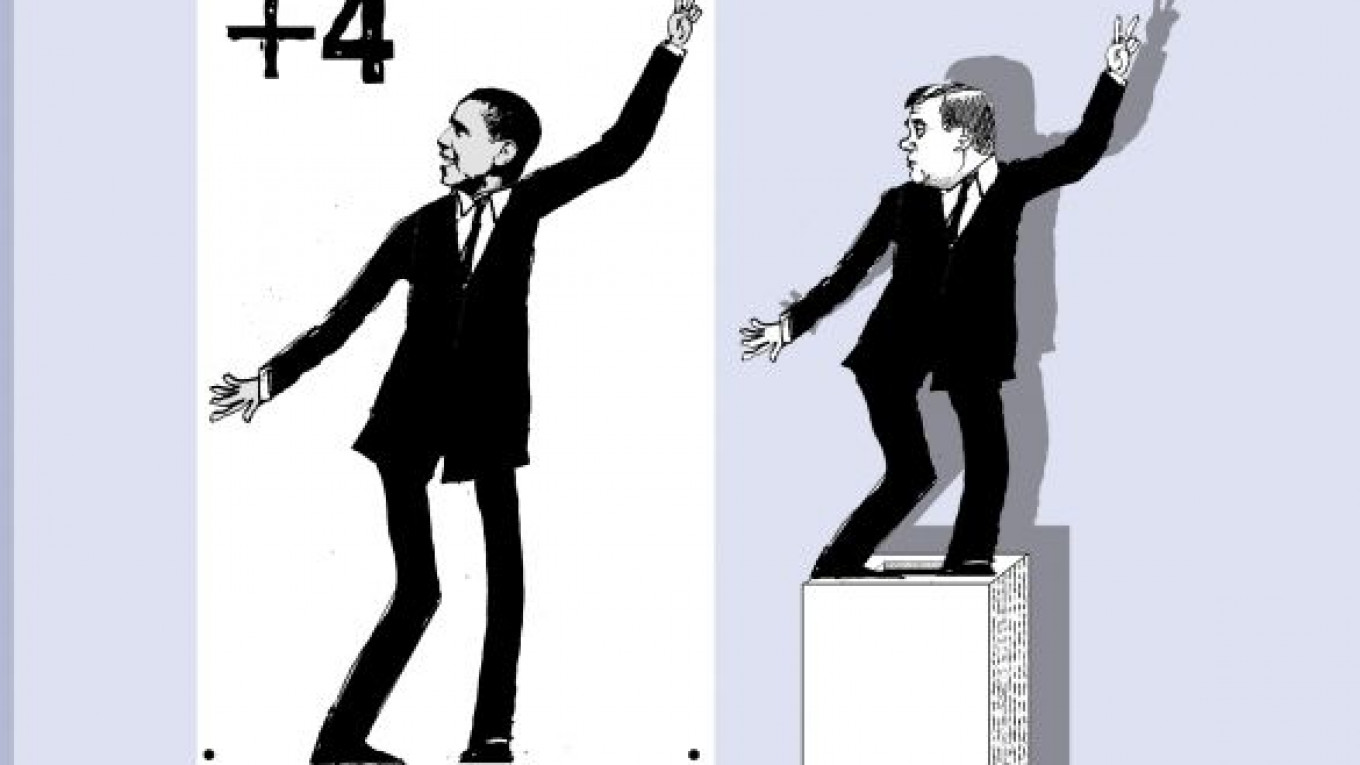Prime Minister Vladimir Putin clearly had the most influence on Dmitry Medvedev in the beginning of Medvedev’s presidential term in 2008. But starting a year or so later, Medvedev’s political role model began to shift away from Putin and toward U.S. President Barack Obama when Medvedev started adopting Obama’s style, language and, most important, many of his political views.
It is fully possible that Obama’s decision to run for re-election inspired Medvedev to seriously consider doing the same. During an interview on Chinese television on April 12, Medvedev promised to make an official announcement about his intentions in the nearest future.
A day later, Putin said an early announcement on the 2012 race could inhibit the work of government employees. “If we now send out some nervous signals, half of the administration and the bigger half of the government will stop working because they expect some change,” Putin said.
Many analysts concluded that this disagreement was a sign of a more intense struggle among Kremlin and business clans. But for the oligarchs, who remain the only real source of power in Russia, the choice between Medvedev and Putin is not of fundamental concern. They know that either candidate will defend their main corporate interests in exchange for loyalty.
Therefore, personality differences between the two leaders are largely irrelevant. Of course, Medvedev’s strong points are his young age, modernization program and his better reputation in the West. Medvedev has been more successful than Putin at exporting a liberal image of a new generation of Russians and is therefore in a better position to satisfy the oligarchs’ desire to keep their assets in the West secure, as well as helping to whitewash their own questionable reputations.
Another factor in Medvedev’s favor is that Putin is showing unsettling signs of excessive narcissism and an almost obsessive desire to remain in power indefinitely.
But there may be another reason to explain why Medvedev has come out of his shell in recent weeks. Medvedev, by nature, tends to be very dependent on others, a trait that was typical of the Soviet intelligentsia. He has been strongly influenced by a range of people throughout his career, from his wife, Svetlana, to his political benefactor, Putin.
Incidentally, Obama has already started forming his campaign staff and starting fundraising activities. In a sense, that sets an example of the West’s commonly accepted standards for political practice that Medvedev can try to emulate. According to Medvedev’s understanding, Russia can only become a respected member on the global arena if it plays the game according to generally accepted rules, with the main principles being free and fair elections and a limit to the number of terms a leader can serve in office.
One can assume that Medvedev was not particularly delighted to learn that Western diplomats compared to him Robin rather than Batman. He is also visibly frustrated by the inability to turn his proposals into reality and his powerlessness to run a proper and legitimate Western-style election campaign. His desire to play the leading role, like Obama, rather than to be perpetually cast as a sidekick will prod him into taking actions that challenge Putin’s vanity and seniority status in the tandem.
Nonetheless, Putin is unlikely to put up strong resistance to Medvedev’s candidacy. This approach could win points for Putin, adding credence to the myth that he actually supports political competition. It also dovetails nicely with Medvedev’s passion for modernizing, however superficially, Russia’s political process. Instead of following Putin’s lead, Medvedev will likely try to run a Western-style presidential election campaign, replete with pseudo-debates, Internet campaign ads, fundraisers and even campaign rallies with cheerleaders.
You can see Medvedev’s admiration for modernization when he shows an almost childlike delight with the Internet and techno gadgets of every type. His eyes light up when he talks about implementing a new technology or approach that would take Russia out of the “analog” 20th century and into the “digital” 21st century, with Skolkovo leading the way.
Modern election campaign tactics and practices are no exception. Medvedev will seek to duplicate Obama’s own campaign as much as possible from start to finish. But these are only superficial similarities and do not reflect the fundamental difference between the two political systems. Ultimately, it will likely be just another inept attempt by Russia to copy the West.
Mark Feygin, a State Duma deputy from 1993 to 1995, is a political analyst.
A Message from The Moscow Times:
Dear readers,
We are facing unprecedented challenges. Russia's Prosecutor General's Office has designated The Moscow Times as an "undesirable" organization, criminalizing our work and putting our staff at risk of prosecution. This follows our earlier unjust labeling as a "foreign agent."
These actions are direct attempts to silence independent journalism in Russia. The authorities claim our work "discredits the decisions of the Russian leadership." We see things differently: we strive to provide accurate, unbiased reporting on Russia.
We, the journalists of The Moscow Times, refuse to be silenced. But to continue our work, we need your help.
Your support, no matter how small, makes a world of difference. If you can, please support us monthly starting from just $2. It's quick to set up, and every contribution makes a significant impact.
By supporting The Moscow Times, you're defending open, independent journalism in the face of repression. Thank you for standing with us.
Remind me later.






